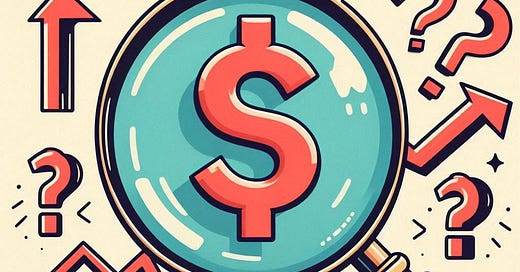Sahm has, as usual, an informative post on … wait for it … inflation …😊 The post fundamentally deals with two issues.
a) What the Fed did, did not do should and should not have done and should do now about inflation and employment.
b) Why people are more unhappy about “inflation” and “the economy” than they are about their personal finances
I have less reason to have a valid opinion of the latter than the former, but I will take a shot anyway as I see a link between the two that Sahm does not mention.
On the first issue, Sahm endorses the Bernanke-Blanchard story
https://www.piie.com/sites/default/files/2024-05/wp\24-11.pdf?utm_source=substack&utm_medium=email
of Inflation being caused by negative supply shocks and a residual of other things. [Comin, Johnson, and Jones
https://www.nber.org/papers/w31179
come to the same qualitative conclusion but with a better, sectorally disaggregated model.] Neither B&B nor CJJ explicitly model Fed policy in arriving at these outcomes, however. This leads Sahm, implicitly I think, to blanketly endorse Fed actions. This is not necessarily wrong, but neither model considers demand shocks as consumers shifted massively from services to goods and then back as concern about COVID waxed and waned. This means that the models and Sahm cannot distinguish how much of Fed-engineered inflation was a) necessarily to deal with supply shocks, b) was necessarily to deal with demand shocks, and c) may have been in excess of what was needed for a) and b). [I discuss B&B and CJJ this at:]
https://substack.com/home/post/p-145235739?source=queue
and
https://thomaslhutcheson.substack.com/p/pandemic-and-inflation
In turn, this leaves Sahm’s position (and mine) that the Fed should now be cutting the EFFR, conceptually ungrounded.
An this is where I try to link the Fed actions to public perceptions.
The Fed has not been transparent in what it was trying to do: engineer enough inflation to allow the economy to adjust to shocks. I should be explicit, explaining that some part of the inflation it engineered was necessary to keep the economy fully employed and, if that’s what it thinks, admitting that it made mistakes in allowing too much inflation to go on for too long. Better understanding of Fed policies ought to diffuse at least some of the discontent with inflation and lead to the perception tat te economy is being better manages than previously thought.
[Standard bleg: Although my style is know-it-all-ism, I do sometime entertain the thought that, here and there, I might be mistaken on some minor detail. I would welcome comments on these views.]





It is not part of our political environment that govt officials or agency’s can admit mistakes , in spite of all the talk in todays society about being vulnerable and transparent. Might be refreshing !
I have sooooo many questions. I looked at the 2 papers you cited and because I dont have a economics background would like to know how data is aggregated. Do economists apply the math models district by district? The phillips curve clearly isn't relevant right now is it? As inflation was high, the pandemic was the pandemic and unemployment is at a record low due to re-industrialization of sorts?
What does a new keynsian model mean? This makes no sense to me unless you are doing a apples to apples comparison.
pharma to pharma, healthcare at a regional level, labour costs in a coastal city say vs the suburbs an hour away.
As far as economic perceptions I would strongly argue several points. I have 'some' small capability of disentangling this verbage. Most people dont. Media in the US is such clickbait, politicians dont represent us, there is fear mongering, honest is a rarity and people sitting down with citizens to explain what's going on or heck even asking their feedback, or input is non-existent. It's a nanny state, or authoritative bureaucracy. People need to feel their participation and ideas have value because they do.
The collective view on the economy are likely to to media BS, and ethical backsliding, along with click-bait economics.
I still think inflation is a combination of supply/demand shocks, money printing, misallocated capital, greedflation, collusion, monopolies, ZIRP, corruption, foreign capital inflows,
I still wish people would talk about inflation in specific sectors like rent, housing etc.....
This was interesting thank you.